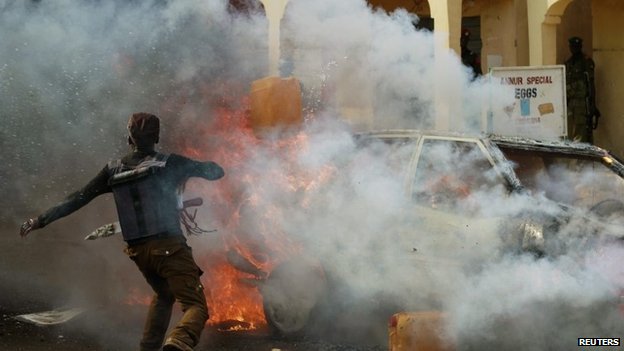February 2, 2015
A bomb has exploded outside a stadium in the Nigerian city of Gombe, minutes after President Goodluck Jonathan left a campaign rally there.
At least three people were killed and 18 others were wounded in the blast, hospital sources said.
Mr Jonathan is standing for re-election on 14 February against former military ruler Muhammadu Buhari.
The militant Islamist group Boko Haram has stepped up its attacks in the run-up to the contest.
‘Angry youth’
Mohammed Bolari, who was at the rally in Gombe, said the explosion occurred some three minutes after Mr Jonathan’s departure, AFP news agency reports.
“The president had just passed the parking lot and we were trailing behind his convoy when the explosion happened,” he was quoted as saying.
 President Jonathan addressed his supporters shortly before the blast
President Jonathan addressed his supporters shortly before the blast Explosions also ripped through the city on Sunday
Explosions also ripped through the city on Sunday Residents have set up checkpoints to defend Gombe
Residents have set up checkpoints to defend GombeMr Jonathan addressed a rally in the north-eastern city a day after it was hit by two blasts that killed at least five people.
Since Monday morning, the city has largely been in lockdown with security operatives restricting the movement of people in most areas, Nigeria’s privately owned Daily Trust newspaper reports.
A local journalist told AFP the latest blast had led to unrest in Gombe, with angry youths attacking supporters of Mr Jonathan’s People’s Democratic Party (PDP).
Analysis by Will Ross, BBC News, Nigeria

It may not have been as large as other bombings in Nigeria but the timing of the latest attack will have shocked the security forces. The violence is escalating in the run-up to elections due in less than two weeks time.
The attacks are blamed on Boko Haram which is against democracy and says it wants to set up a caliphate.
As well as the bombings the military is facing a huge challenge as the Boko Haram fighters try to capture more territory in the north-east.
On Sunday, the military and local vigilantes prevented the jihadists from penetrating Maiduguri city in Borno state for the second time in a week.
“They were shouting and denouncing the president’s visit which they blamed for the attack,” he added.
Northern Nigeria is seen as Mr Buhari’s stronghold.
On Sunday, a bomb also exploded in the north-eastern town of Potiskum outside the home of a politician who had organised a campaign meeting.
The election is expected to be the most tightly contested since military rule ended in 1999 but there are growing fears that voters in areas controlled by Boko Haram will not be able to vote.
Last week, the African Union (AU) backed plans for the deployment of a 7,500-strong regional force to fight Boko Haram.
Four of Nigeria’s neighbours – Benin, Cameroon, Chad and Niger – have agreed to contribute troops to the task force.
Mr Jonathan declared a state of emergency in Nigeria’s north-eastern states of Borno, Yobe and Adamawa in May 2013, but it has not stopped from continuing its offensive to seize territory.
The six-year insurgency has killed thousands of people and displaced some 1.5 million.
Source: BBC




